| Listing 1 - 10 of 18 | << page >> |
Sort by
|

ISSN: 14342650 ISBN: 3161485866 9783161485862 Year: 2005 Volume: 13 Publisher: Tübingen : Mohr Siebeck,
Abstract | Keywords | Export | Availability | Bookmark
 Loading...
Loading...Choose an application
- Reference Manager
- EndNote
- RefWorks (Direct export to RefWorks)
Dialectic. --- Dialectique --- Plato. --- Plato --- Dialectic --- Polarity --- Polarity (Philosophy) --- Plato - Philebus
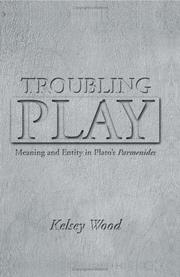
ISBN: 0791482944 1423747739 9781423747734 0791465195 9780791465196 9780791482940 Year: 2005 Publisher: Albany, N.Y. State University of New York Press
Abstract | Keywords | Export | Availability | Bookmark
 Loading...
Loading...Choose an application
- Reference Manager
- EndNote
- RefWorks (Direct export to RefWorks)
Troubling Play is a new and illuminating interpretation of Plato's Parmenides—notoriously the most difficult of the dialogues. Showing that the Parmenides is an inquiry into time and the forms of language, author Kelsey Wood notes that the dialogue's suggestion of sophistry is intended to provoke the silently observant Socrates. The young Socrates believes that knowing is prior to existence, but Parmenides ultimately shows him that the meaning of intelligible discourse is derived from existence in time. Although we cannot think apart from intelligible forms, nevertheless, any number of modes of intelligibility are possible. This relation of ideals of intelligibility—the forms of logos—to temporal being is a crucial topic of special relevance to philosophers today.Wood's detailed methodological analysis ties the Parmenides to other later dialogues such as the Sophist, Theatetus, and Philebus, and also to earlier works such as the Republic and the poem of Parmenides.
Dialectic. --- Ontology. --- Being --- Philosophy --- Metaphysics --- Necessity (Philosophy) --- Substance (Philosophy) --- Polarity --- Polarity (Philosophy) --- Plato. --- Dialectic --- Ontology
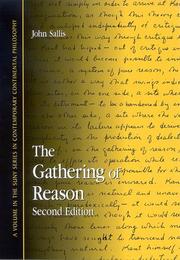
ISBN: 1423744195 9781423744191 0791464539 9780791464533 0791464547 9780791464540 9780791483275 0791483274 Year: 2005 Publisher: Albany State University of New York Press
Abstract | Keywords | Export | Availability | Bookmark
 Loading...
Loading...Choose an application
- Reference Manager
- EndNote
- RefWorks (Direct export to RefWorks)
This second edition of The Gathering of Reason expands on John Sallis's classic study of Kant's First Critique. This study examines the relation of imagination to reason and to human knowledge and action in general. Moving simultaneously at several different hermeneutical levels, Sallis carries out an interpretation of the Transcendental Dialectic of Kant's Critique of Pure Reason. Although, in contrast to the Analytic, the Dialectic seldom refers explicitly to imagination, Sallis shows that the concept of reason in the Dialectic requires the complicity of imagination. Sallis demonstrates that for Kant, reason alone does not suffice for bringing before our minds the metaphysical ideas of the soul, the world, and God; rather it is through the force of imagination that these ideas are brought forth and made effective. A new preface situates the book in relation to Sallis's later work, and an extensive afterword focuses on Kant and the Greeks.
Transcendentalism. --- Dialectic. --- Imagination. --- Reason. --- Knowledge, Theory of. --- Philosophy --- Philosophy, Modern --- Idealism --- Mind --- Intellect --- Rationalism --- Epistemology --- Theory of knowledge --- Psychology --- Imagery, Mental --- Images, Mental --- Mental imagery --- Mental images --- Educational psychology --- Reproduction (Psychology) --- Polarity --- Polarity (Philosophy) --- Kant, Immanuel,
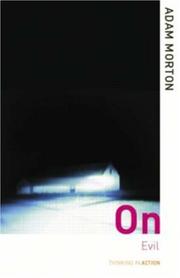
ISBN: 0415305195 0415305187 0203704126 9780203704127 9786610077755 6610077754 9780415305181 9781134406067 9781134406104 9781134406111 9780415305198 1280077751 113440610X 0203352130 1134406118 1283962640 Year: 2005 Publisher: New York, N.Y. Routledge
Abstract | Keywords | Export | Availability | Bookmark
 Loading...
Loading...Choose an application
- Reference Manager
- EndNote
- RefWorks (Direct export to RefWorks)
Evil has long fascinated psychologists, philosophers, novelists and playwrights but remains an incredibly difficult concept to talk about. On Evil is a compelling and at times disturbing tour of the many faces of evil. What is evil, and what makes people do awful things? If we can explain evil, do we explain it away? Can we imagine the mind of a serial killer, or does such evil defy description? Does evil depend on a contrast with good, as religion tells us, or can there be evil for evil's sake?Adam Morton argues that any account of evil must help us understand three things: w
Metaphysics --- General ethics --- Good and evil. --- Good and evil --- Evil --- Wickedness --- Ethics --- Philosophy --- Polarity --- Religious thought --- Ethics.
Book
ISBN: 2707146129 9782707146120 Year: 2005 Volume: *4 Publisher: Paris : La Découverte,
Abstract | Keywords | Export | Availability | Bookmark
 Loading...
Loading...Choose an application
- Reference Manager
- EndNote
- RefWorks (Direct export to RefWorks)
Good and evil --- Social psychology --- Bien et mal --- Psychologie sociale --- Social Psychology --- Submission and Altruism --- Good and Evil --- Evil --- Wickedness --- Ethics --- Philosophy --- Polarity --- Religious thought --- Altruism
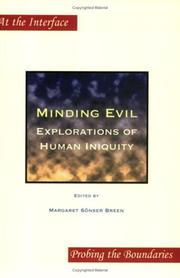
ISBN: 9401201501 1423787560 9781423787563 9042016787 9789042016781 9789401201506 Year: 2005 Publisher: Amsterdam New York Rodopi
Abstract | Keywords | Export | Availability | Bookmark
 Loading...
Loading...Choose an application
- Reference Manager
- EndNote
- RefWorks (Direct export to RefWorks)
Minding Evil: Explorations of Human Iniquity brings together fifteen essays, versions of which were presented at the Fifth International Conference on Evil and Wickedness, held in Prague in 2004. The volume examines evil and wickedness from a variety of disciplines, including criminology, cultural studies, gender studies, law, literature, peace studies, philosophy, psychology, and sociology. In so doing Minding Evil keeps in play the doubled meaning of its title: on the one hand, to tend to evil, that is, to oversee, cultivate, and deploy it; on the other hand, to be bothered by evil and so, in learning to identify or recognise it, to try to understand its workings and thus contain or control it and, perhaps, repair or undo it. While the essays taken together work to show the difficulty and at times the travesty of not being able to distinguish between the two meanings, it is this second meaning that remains key. What are the individual and collective responsibilities entailed in minding - being troubled by - evil? This is the central question of this volume.
Good and evil. --- Ethics. --- Deontology --- Ethics, Primitive --- Ethology --- Moral philosophy --- Morality --- Morals --- Philosophy, Moral --- Science, Moral --- Philosophy --- Values --- Evil --- Wickedness --- Ethics --- Polarity --- Religious thought
Book
ISBN: 3525252595 9783525252598 Year: 2005 Volume: 160 Publisher: Göttingen : Vandenhoeck & Ruprecht,
Abstract | Keywords | Export | Availability | Bookmark
 Loading...
Loading...Choose an application
- Reference Manager
- EndNote
- RefWorks (Direct export to RefWorks)
Sceptici (Griekse filosofie) --- Scepticisme (Griekse filosofie) --- Scepticisme (Philosophie grecque) --- Sceptiques (Philosophie grecque) --- Skeptics (Greek philosophy) --- Dialectic --- Dialectique --- History --- Histoire --- Sextus, --- Skepticism. --- Skepticism --- Scepticism --- Unbelief --- Agnosticism --- Belief and doubt --- Free thought --- Polarity --- Polarity (Philosophy) --- Sekst, --- Sesto, --- Sexto, --- Sextos, --- Sextus Empiricus --- To 1500 --- Sekstus,
Book
ISBN: 9033456222 Year: 2005 Publisher: Leuven Acco
Abstract | Keywords | Export | Availability | Bookmark
 Loading...
Loading...Choose an application
- Reference Manager
- EndNote
- RefWorks (Direct export to RefWorks)
Religious studies --- #gsdb10 --- C1 --- kwaad (x) --- religie --- spiritualiteit --- christendom --- islam --- boeddhisme --- jodendom --- humanisme --- Kerken en religie --- Good and evil --- Evil --- Wickedness --- Ethics --- Philosophy --- Polarity --- Religious thought --- Religious aspects --- ethiek --- kwaad --- godsdienst --- Boeddhisme --- China --- Zoroastrisme --- Jodendom --- Christendom --- Islam --- hekserij --- Afrika
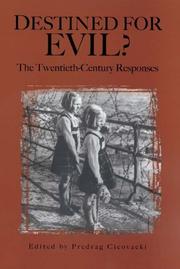
ISBN: 1281741272 9786611741273 1580466400 158046176X Year: 2005 Publisher: Rochester, NY : University of Rochester Press,
Abstract | Keywords | Export | Availability | Bookmark
 Loading...
Loading...Choose an application
- Reference Manager
- EndNote
- RefWorks (Direct export to RefWorks)
This collection of 15 essays on various aspects of the problem of evil brings together the opinions of well known authors from various disciplines [philosophy, theology, literary criticism, political science, etc]. This collection brings together a variety of responses to the ancient questions of whether we are -- individually and collectively -- destined for evil. The history of the previous century brought this question into the open morepoignantly than perhaps any other before it. Not surprisingly, then, what you will find here is a wide spectrum of opinions concerning the mystery of evil formulated throughout the twentieth century and at the very threshold of the twenty-first, which has inherited all of its open wounds and nightmarish memories. The pieces included here come from diverse fields: philosophy, religious studies, psychology, history, political science, and art; they also assume a variety of forms: essays, treatises, stories, correspondence, and interviews. The reader should not expect that the pieces collected here offer proven recipes of how to eliminate evil from the world: rather, they present a compelling testimony of human struggles with an aspect of our lives we cannot afford to ignore. Contributors: Sharon Anderson-Gold, Hannah Arendt, Gil Bailie, Daniel Berrigan, Albert Camus, John P. Collins, Thomas Del Prete, Albert Einstein, Emil Fackenheim, Sigmund Freud, Philip Paul Hallie, Carl Gustav Jung, Michael Lerner, John Montaldo, Susan Neiman, Jeffrey Burton Russell, Aleksandr Solzhenitsyn, Tzvetan Todorov, Leo Tolstoy, Michael True, Nicholas Wolterstorff Predrag Cicovacki is Associate Professor of Philosophy at the College of the Holy Cross, Worcester, Massachusetts, where he served as director of Peace and Conflict Studies and editor-in-chief of Diotima: A Philosophical Review. His publications include Anamorphosis: Kant on Knowledge and Ignorance (1997), Between Truth and Illusion: Kant at the Crossroads of Modernity (2002), Essays by Lewis White Beck: Fifty Years as a Philosopher (1998), and Kant's Legacy: Essays in Honor of Lewis White Beck (2001).
Good and evil. --- Ethics, Modern --- Evil --- Wickedness --- Ethics --- Philosophy --- Polarity --- Religious thought --- art. --- correspondence. --- essays. --- evil. --- history. --- human lives. --- interviews. --- literary criticism. --- nightmarish memories. --- opinions. --- philosophy. --- political science. --- psychology. --- questions. --- religious studies. --- responses. --- stories. --- struggle. --- theology. --- treatises. --- twentieth century.
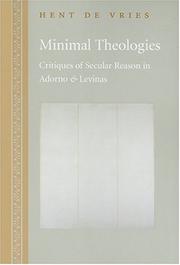
ISBN: 0801880173 0801880165 9780801880179 Year: 2005 Publisher: Baltimore Johns Hopkins university press
Abstract | Keywords | Export | Availability | Bookmark
 Loading...
Loading...Choose an application
- Reference Manager
- EndNote
- RefWorks (Direct export to RefWorks)
What, at this historical moment "after Auschwitz," still remains of the questions traditionally asked by theology? What now is theology's minimal degree? This magisterial study, the first extended comparison of the writings of Theodor W. Adorno and Emmanuel Levinas, explores remnants and echoes of religious forms in these thinkers' critiques of secular reason, finding in the work of both a "theology in pianissimo" constituted by the trace of a transcendent other. The author analyzes, systematizes, and formalizes this idea of an other of reason. In addition, he frames these thinkers' innovative projects within the arguments of such intellectual heirs as Jurgen Habermas and Jacques Derrida, defending their work against later accusations of "performative contradiction" (by Habermas) or "empiricism" (by Derrida) and in the process casting important new light on those later writers as well. Attentive to rhetorical and rational features of Adorno's and Levinas's texts, his investigations of the concepts of history, subjectivity, and language in their writings provide a radical interpretation of their paradoxical modes of thought and reveal remarkable and hitherto unsuspected parallels between their philosophical methods, parallels that amount to a plausible way of overcoming certain impasses in contemporary philosophical thinking. In Adorno, this takes the form of a dialectical critique of dialectics; in Levinas, that of a phenomenological critique of phenomenology, each of which sheds new light on ancient and modern questions of metaphysics, ethics, and aesthetics. For the English-language publication, the author has extensively revised and updated the prize-winning German version.
Deconstruction. --- Dialectic. --- Philosophical theology. --- Rationalism. --- Transcendence (Philosophy) --- Transcendence (Philosophy). --- Deconstruction --- Dialectic --- Philosophical theology --- Rationalism --- Philosophy --- Knowledge, Theory of --- Religion --- Belief and doubt --- Deism --- Free thought --- Realism --- Theology, Philosophical --- Philosophy and religion --- Theology, Doctrinal --- Polarity --- Polarity (Philosophy) --- Criticism --- Semiotics and literature --- Adorno, Theodor W., --- Lévinas, Emmanuel. --- Wiesengrund, Theodor, --- Wiesengrund-Adorno, Theodor, --- Adorno, Teodor V., --- Adorŭno, --- אדורנו, תאודור --- אדורנו, ת. ו. --- Adorno, Th. W. --- Lévinas, Emmanuel. --- Lévinas, E. --- Leṿinas, ʻImanuʼel --- Levinas, Emani︠u︡el --- לוינס׳ עמנואל --- לוינס, עמנואל --- Līfīnās, Īmānwāl --- ليفيناس، إيمانوال --- Adorno, Theodor W. --- Lévinas, Emmanuel --- Adorno, Theodor W, - 1903-1969 --- Lévinas, Emmanuel --- Adorno, Theodor Wiesengrund, 1903-1969 --- Levinas, Emmanuel, 1906-1995
| Listing 1 - 10 of 18 | << page >> |
Sort by
|

 Search
Search Feedback
Feedback About UniCat
About UniCat  Help
Help News
News